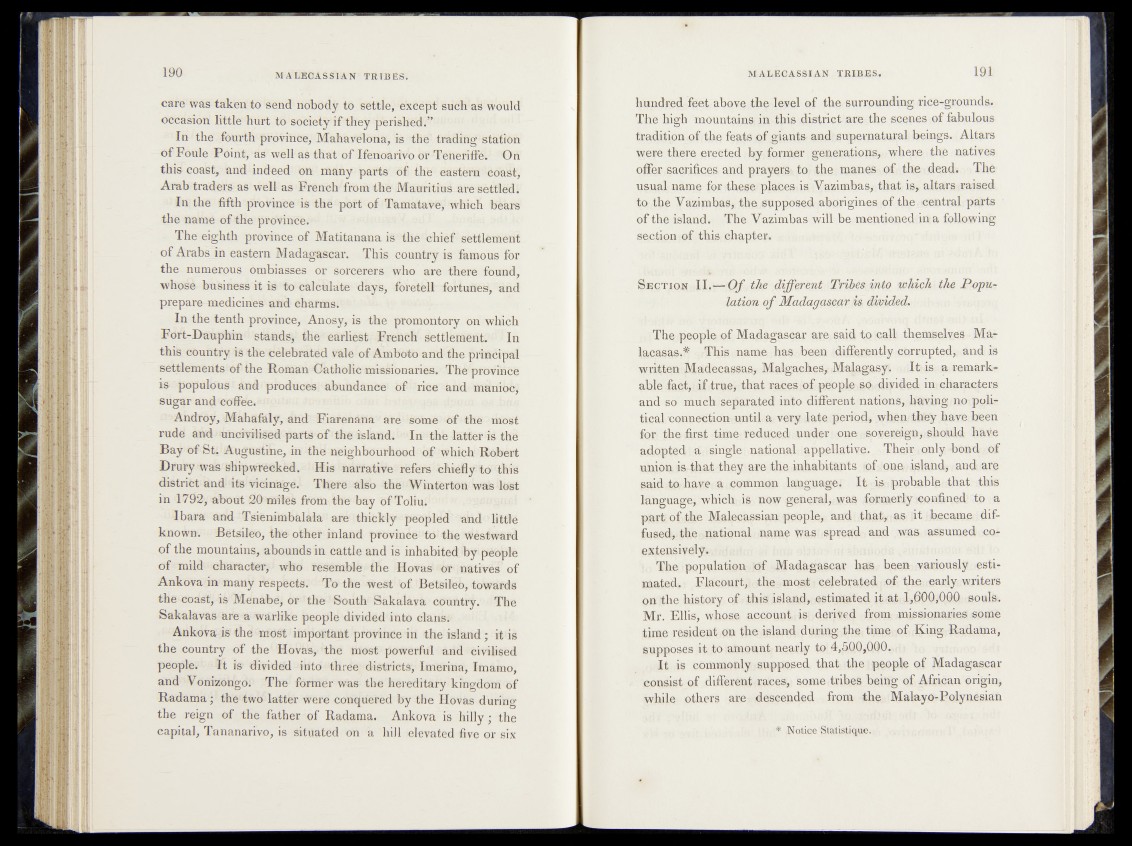
care was taken to send nobody to settle, except such as would
occasion little hurt to society if they
In J the fourth province, Mahavelona, is the' trading station
of Foule Point, as well as that of Ifenoarivo or Teiieriffk; Oh.
this coabt^ and indeed on many; parts of the eastern ec^St,
Arab traders as well as French-from the ManritiuS-are settled ;
In the fifth province is the port c^ Tamatavey which bears
the name of the province.'
The eighth province of Matitanana i^ th e chief settlenSent
of Arabs in eastern Madagascar. This country is famous for
the numerous ombiasses or sorcerers who are there found,
whose business it is to calculate days, foretell fortunes, and
prepare medicines and charms.
In the tenth province, Anosy, is the promontory on which
Fort-Dauphin stands the-easiest French settlement. In
this country is the celebrated vale of Arnboto and the principal
settlements of the Roman Catholic missionaries. Thc'provifflde
is populous and produce abundance of rice and manioh>
sugar and coffee.
Andfoy, Mahafaly, and Fiarenana are some of the most
rude and uncivilised parts of the island. In the latter is the
Bay Of St; Augustine, in the neighbourhood of which Robert
Drury was shipwrecked. His narrative refers chiefly to this
district and its vicinage. There also the Winterton was dost
in 179% about 20 miles from the bay of Toliu.
Ibara and Tsienimbalaia are thickly peopled and little
known. Betsileo, the other inland province to the Westward
of the mountains, abounds in cattle and is inhabited by pCople
of mild character, who resemble the Hovasor natives of
Ankova in many respects. To the west of Betsileb, towards
the coast, is Menabe, or the South Sakalava country. The
Sakalavas are a warlike people divided into clans;
Ankova is the most important province in the island; it is
the country of the Hovas, »the most powerful and civilised
people* It is divided into three districts, Imerina, Imamo,
and VonizongoJ The fortner was the hereditary kingdom of
Radama; the two latter were conquered by the Hovas during
the reign of the father of Radama. Ankova is hilly; the
capital, Tananarive, is situated on a hill elevated five or six
hundred feet above the level of the surrounding rice-grounds.
The high mountains in this district are the scenes of fabulous
tradition p f the f§gts pf giants and? supernatural. beings. Altars
were thereprected <by. former generations, where the natives
offer sacrifices, and prayers < to. the manes of the dead. The
usual name for these places>is Yazimbas,- that is, altars raised
to the Yazimbas, the supposed aborigines of the central parts ■
of the island. The Vazimbas #ill be raehtiepedtinia following
section of this chapter.
Section II.—O f ,tjpe different Tribes inti) fjohich the Population
o f Madagascar is. divided.
The people of Madagascar are said to-call themselves Ma-
lacasas** This name has .been differently corrupted, and is
written: Madecassas, Malgaches,- .Malagasy. §ii t is a remarkable
faet,,if true, that rppeSiOf people so -divided in* characters
and so! much separated into different nations,, having| no: political
connection until a very late period, when, they have been
fort the first time- redppedifunderhoneB^iei^gn>jphopM have
adpptedatsinglernationalappellative:. Thgir^only bond-of
union is-that they are the inhabitants ipfriooft,r^land§ /and are
said to have a common language; It is . probable that this
language, which is now .general, was formerly confined to a
part. o£ the Maleeassian people,. and that, as.-if became diffused,
the .national name was -spread and , was assumed co*
extensively*. ,
h The * population jdf Madagascar has. been variously estimated.
Flaeourt, themosti celebrated o f the. early writers
on the history. of this island, estimated it at l,60G,0Jti-aouls.
Mr. Ellis, whoso aecptetfi#!, derived
time resident on
supposes it to amount, nearly tpi
It is obmmonly.t§t>fi#sed tbatidhej-peoplp of Madagascar
consist of differentvaces,- some.triheS being ofi^fipcan origin,
while others are descended from the Malayo-Polynesian
;* .Notice Stalistique.